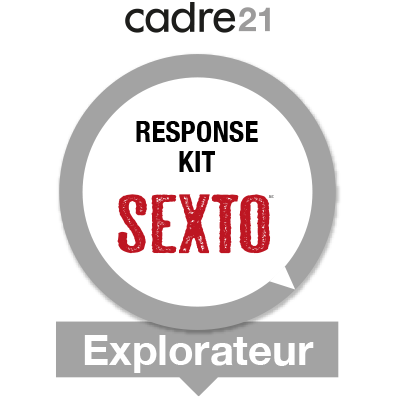Sexto response kit 1 - Explorateur
Partenaire actif de votre développement professionnel.
Sexto response kit 1 - Explorateur
Certaines conditions
s'appliquent
Si vous avez déjà un compte
Description
For legal reasons, the use of the SEXTO kit is reserved exclusively for Quebec’s education sector personnel. In addition, its use must be the subject of a prior agreement between the police force that serves the territory where the school is located and the Directeur des poursuites criminelles et pénales (DPCP). Please note that an attestation badge will only be attributed to personnel at education institutions in a territory where such an agreement has been concluded. Before completing the training program, it is therefore recommended that you validate this information with your superiors or your police force.
This training program is designed to equip education sector personnel to act quickly and efficiently with the students in their institution who are involved in a sexting situation. Sexting among teenagers can be defined as the shared production, distribution, and redistribution of sexual content (photos, videos, etc.) via information and communication technologies. At the end of the Explorer level of this training program, you will be able to understand the phenomenon and guide those involved in the management of cases that could be brought to their attention through an intervention tool, namely the Sexto kit. At the Architect level, through interactive organized activities, you will be presented with three fictional cases of sexting in order to consolidate new learning and validate your interventions.
The creation of the Sexto kit was made possible thanks to the collaboration of the City of Saint-Jérôme (Quebec), the Directeur des poursuites criminelles et pénales (DPCP), the Canadian Centre for Child Protection, the Crime Victims Assistance Centre (CAVAC), Commission scolaire de la Rivière-du-Nord, and Académie Lafontaine. The Sexto Kit training program was developed by CADRE21 and carried out thanks to the participation of Fédération des établissements d’enseignements privés (FEEP) and funding from the ministère de l’Éducation et de l'enseignement supérieur (Quebec ministry of education and higher education, or MÉES).
Complétez ce niveau et demandez le badge :
Sexto response kit 1 - Explorateur
Critères d’obtention :
Develop a reflection on
- What I have learned from the Sexto intervention method.
- What this training program will change for my future interventions.
- What I consider to be particularly important for the students when I am called upon to intervene.

-(1).png)
